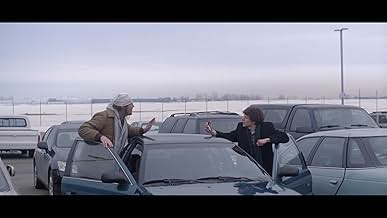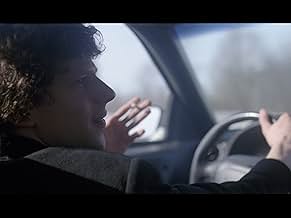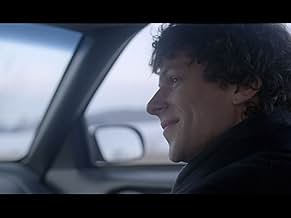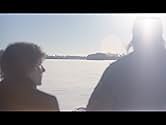A história da entrevista de cinco dias entre o repórter da Rolling Stone David Lipsky e o aclamado romancista David Foster Wallace, que aconteceu logo após a publicação do romance épico inov... Ler tudoA história da entrevista de cinco dias entre o repórter da Rolling Stone David Lipsky e o aclamado romancista David Foster Wallace, que aconteceu logo após a publicação do romance épico inovador de Wallace, 'Infinite Jest', em 1996.A história da entrevista de cinco dias entre o repórter da Rolling Stone David Lipsky e o aclamado romancista David Foster Wallace, que aconteceu logo após a publicação do romance épico inovador de Wallace, 'Infinite Jest', em 1996.
- Direção
- Roteiristas
- Artistas
- Prêmios
- 4 vitórias e 18 indicações no total
- Bookstore Patron 2
- (as Jennifer Holman)
- Direção
- Roteiristas
- Elenco e equipe completos
- Produção, bilheteria e muito mais no IMDbPro
Avaliações em destaque
What little there is of plot is made up for in excellent characterization. The film is really all about existentialism, and thankfully it never leans towards pretentiousness. Rather there is an air of optimism about making your time on earth worthwhile. Wallace and Lipsky in a way represent two extremes of existentialism. Wallace is very relaxed, and takes his newfound celebrity with a grain of salt, while Lipsky is very Type-A, yet never brash or irritating. Lipsky has been trying to get his foot in the door as an author for a while now, while Wallace almost became famous overnight, and the film plays with the concept of "fame" in fun and unique ways. Through the film, Ponsoldt is able to explore these two extremes and find common ground between them, all while touching on the idea of fame and what it means to different people.
The script is outstanding, and hits all the right notes I touched on above. The dialogue between Lipsky and Wallace feels natural, nothing is forced. I wonder how much improvisation was done for the film, because the two seem like good friends from the moment they meet. There is a natural chemistry that draws these two characters together, and it's outstanding to watch on-screen. It's difficult to adapt a book like Lipsky's, which is mostly interviews and recording, as the book was published after Wallace's death in 2008. But screenwriter Donald Marguiles makes it work, and the result is an insightful, often hilarious film.
All this talk about chemistry would be a waste if it weren't for Jason Segel and Jesse Eisenberg as Wallace and Lipsky, respectively. Segel is a marvel as Wallace; it's a performance that doesn't demand much, yet Segel taps into all of Wallace's nuances and quirks. His delivery, cadence, and warmth almost makes it feel like you're talking to an old friend. It's a subtle performance that I hope is remembered come awards season. Eisenberg, too, is great. His reporter-type isn't very developed until the middle-end of the film, and he might come across as annoying for some. But he makes Lipsky tick as the curious interviewer wanting to learn more. He's driven by his desire to success, his want to make a successful piece for Rolling Stone, yet he ends up with a lot more.
The End of the Tour is a huge success. It isn't a very showy film, without much in the way of technical prowess, yet it's a talker. The realistic dialogue and blasé tone make the film feel like a 140 minute hang out with two good friends. Ponsoldt keeps a tight grip on the film's themes, never letting one overpower the film's true intentions. It's a wonderful ode to Wallace, and a funny one at that.
I don't expect everyone to like it to the degree that I did because I can only base my strong inclination towards this movie on the connection I personally made with it which was emotional rather than intellectual, although the film is rich and lingering in its intellect as well, and of course; I recognize what makes this film profound, which I'll try to explain.
This is a talky film from director James Ponsoldt, who I'd now have to rank as one of my favorite contemporary directors after this and another I've seen and loved, The Spectacular Now. This director isn't one you'd normally find on a list ranking among the greatest working today because he's not about style and doesn't appeal to the ego as much as other contemporaries such as Wes Anderson and David Fincher do (in addition to many others, not to single them out). No, Ponsoldt is subtle and reserves his ego. He is unimposing on the lives of his characters and candid about what his films are trying to do and say, not hiding beneath film rhetoric or allegory or the impression of a representational work. And what's great about this is how his films point out that you don't need intricate sets or perfectly symmetrical shots to create beauty. This film has some of the most beautiful shots I've seen (the shot of them walking in the snow, the shot of the normally- withdrawn Wallace dancing), all the more so because of their subtlety, giving the feeling that the beauty was discovered and not created by the director.
But the beauty is often created by the actors. Ponsoldt trusts his actors and puts his efforts towards making the characters come alive before our eyes. I was under the fantastic impression that I was witnessing a completely real human soul with Segel's performance. He felt so real, so three dimensional. I understand him, even though I am not him. This is more magical to me than sweeping camera movements or extravagant art direction.
I didn't realize when watching the film that the dialogue is all based on, if not directly taken from, the tapes journalist (and protagonist) David Lipsky (Eisenberg) recorded of his interviewee, universally acclaimed novelist David Foster Wallace (Segel). The dialogue is rich with insight into the character's thought processes and their observations on life (but mostly those of Wallace). I was riveted at every moment the two were talking, feeling as though being revealed before me were the truths of life. The thrill of being a fly on the wall. And it's not just the words containing the wisdom of the thoughtful and complicated Wallace, but the delivery via the actors and the way in which the many hours of tape are edited to allow Wallace's ideas and observations to resonate. Even beyond Wallace's ideas, the film cuts to the core and observes Wallace as a human being, not different for his brilliance but the same for his humanness.
The film is about so many things it would be overwhelming to attempt list all of them. Its ideas, however many, are all-encompassing of what it means to exist, which is, beyond the desire for fame and ego-boosts, to want to be understood. The film observes how the inner-worlds of all people are so uniquely complicated and pays tribute to that wonder. I'll be relating my experiences to this film in time to come.
Você sabia?
- CuriosidadesThe song heard on the soundtrack when the film ends is "The Big Ship" by Brian Eno, one of David Foster Wallace's favorite songs. It was also used for the climax of Eu, Você e a Garota Que Vai Morrer (2015), another film that premiered at the 2015 Sundance Film Festival.
- Erros de gravaçãoIn regards to the scene where Mrs. Gunderson gives Mr. Wallace and Mr. Lipsky a car tour of Minneapolis sites: The Mary Tyler Moore statue on Nicollet Mall in Minneapolis, was not given to the City by TV Land until 2002. Also, it is not legal for cars to drive down Nicollet Mall.
- Citações
David Foster Wallace: It may be in the old days what was known as a spiritual crisis: feeling as though every axiom in your life turned out to be false... and there was actually nothing. And that you were nothing. And that it's all a delusion and you're so much better than everybody 'cause you can see how this is just a delusion, and you're so much worse because you can't fucking function.
- Cenas durante ou pós-créditosHalfway through the closing credits, there is an extra scene told from the perspective of David Foster Wallace as Lipsky goes to the bathroom to wash out the chewing tobacco. It shows what Wallace did while he was in the bathroom: he speaks privately into the tape recorder.
Principais escolhas
- How long is The End of the Tour?Fornecido pela Alexa
Detalhes
- Data de lançamento
- País de origem
- Central de atendimento oficial
- Idioma
- Também conhecido como
- El último tour
- Locações de filme
- Empresas de produção
- Consulte mais créditos da empresa na IMDbPro
Bilheteria
- Faturamento bruto nos EUA e Canadá
- US$ 3.002.884
- Fim de semana de estreia nos EUA e Canadá
- US$ 123.238
- 2 de ago. de 2015
- Faturamento bruto mundial
- US$ 3.072.991
- Tempo de duração1 hora 46 minutos
- Cor
- Mixagem de som
- Proporção
- 2.35 : 1
Contribua para esta página


































